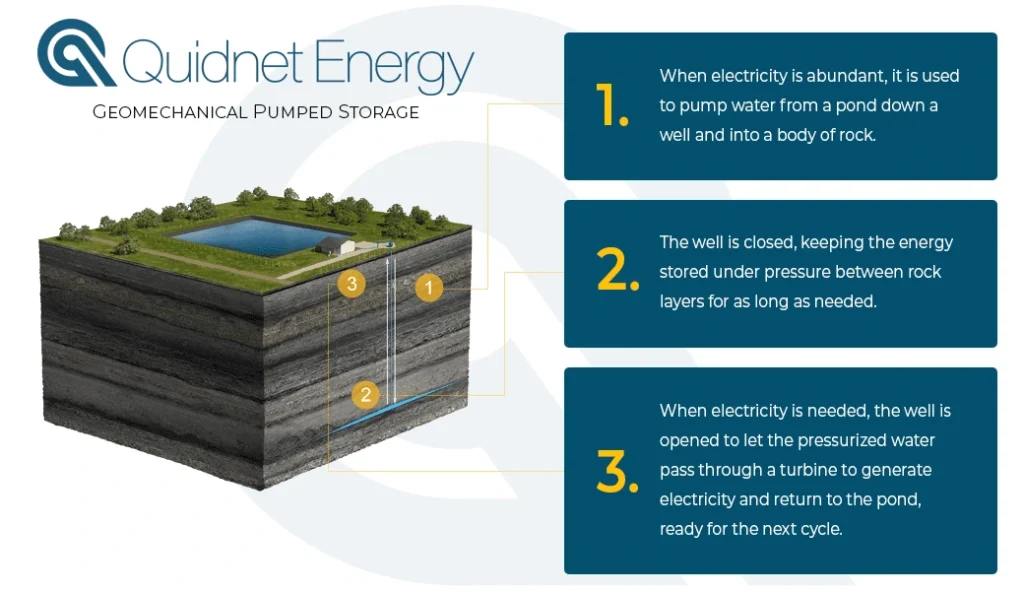
Quidnet, a company developing a proprietary mechanical energy storage technology, has been selected to receive funding from the US Advanced Research Projects Agency – Energy (ARPA-E).
ARPA-E is part of the federal Department of Energy (DOE) and as the name suggests, promotes and funds R&D into advanced and innovative energy technologies.
To date it has backed dozens of energy storage and renewable energy commercialisation projects for players including semi-solid electrode company 24M, and various companies and academic institutions working with flow batteries.
Quidnet claims the Geomechanical Pumped Storage technology it has developed is widely deployable at low cost and offers several advantages over pumped hydro energy storage (PHES), the legacy technology it most closely resembles.
Unlike conventional pumped hydro which requires two large reservoirs of water, one at a higher elevation to the other, Quidnet drills deep into subsurface layers of rock and creates an underground reservoir beneath an above-ground body of water.
At times of abundant generation when electricity demand is off-peak and low, water is pumped down into the body of rock from the pond above through a well. The closed loop well then keeps the water stored between the rock layers under pressure.
When the system discharges, the pressurised water is passed up the well through a turbine to generate electricity. As it does that, it refills the upper pond, ‘recharging’ the system. The vertical design also means a significantly smaller land use requirement than conventional PHES, Quidnet said.
The company claims this design uses many existing techniques and technologies from the hydroelectric and other power generation industries, theoretically offering lower cost of long-duration energy storage (LDES) than other technologies and competitive with gas peaker plants in a modular and replicable design.
Quidnet was selected to get US$10 million from ARPA-E as part of the agency’s programme, Seeding Critical Advances for Leading Energy technologies with Untapped Potential (SCALEUP).
The funding will be used towards the cost of Quidnet’s project with municipal utility CPS Power in San Antonio, Texas.
Quidnet aims to scale its technology for a 1MW/10MWh, 10-hour duration energy storage facility for CPS Power. The project could assist CPS in meeting carbon emissions reduction and renewable energy goals, with the utility targeting 80% emissions reduction by 2040. Quidnet will get the opportunity to bring its system design up to commercial scale from its current pilot stage.
Quidnet was the only energy storage company selected among eight recipients of ARPA-E’s SCALEUP programme funding for its 2021 cohort, announced late last month. Other winners include companies working in fields like sustainable aviation, floating offshore wind turbines and decarbonisation of paper recycling.
Technologies and companies selected for SCALEUP are ones that ARPA-E has previously worked with and helped to fund and that have been determined by the agency to have a good probability of scaling up for commercial success, hence the name. Quidnet got ARPA-E funding worth just under US$3.3 million back in 2018.
In the previous 2019 SCALEUP cohort, winners included sodium-ion battery company Natron Energy, 24M Technologies, silicon anode company Sila Nanotechnologies and AutoGrid Systems’ virtual power plant (VPP) technology.
The Quidnet-CPS project’s stated objective is to lower costs associated with LDES by 50% to 75%. The two companies announced the project in March as they signed a 15-year agreement.
“Meeting the President’s goals of cutting greenhouse gases by 50% by 2030 and reaching net-zero emissions by 2050 will require an acceleration of private sector investments across the clean energy and transportation sectors,” US Secretary of Energy Jennifer Granholm said as funding was announced last month.
“These projects will catalyse the commercialisation of promising technologies so that they are available to be broadly deployed across the country in support of reaching our clean energy future.”